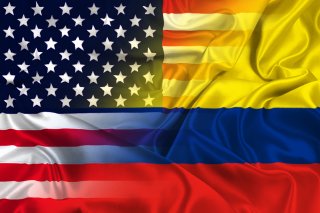What’s Next for U.S.-Colombia Relations After Petro’s White House Visit?
While there will inevitably be points of disagreement between Washington and Bogota, the historic and strategic nature of this partnership needs to be preserved.
While this week’s White House meeting between Colombian president Gustavo Petro and U.S. president Joe Biden saw no major announcements, the meeting itself was historic—and shows that both countries understand the importance of maintaining a close relationship in spite of policy differences.
The irony of his Washington visit was probably not lost on Petro. The Colombian leader has often commented on the way that his transition from Marxist guerrilla to mainstream politician—and his country’s first progressive president—has shaped his view of the United States. After shaking hands and exchanging gifts with CIA director William Burns in Bogota in October, Petro remarked: “A few decades ago we might have been enemies, today I’m giving him a hammock and a bag of sugar.”
This relationship has not been easy. Petro has been deeply critical of Colombia’s traditional counternarcotics approach, which has been a pillar of the U.S.-Colombia relationship over the last three decades. While coca cultivation and cocaine production numbers have reached record highs, Petro is emphasizing the need to provide economic opportunities in rural areas over conventional military-led crop eradication.
The Colombian president’s trademark domestic policy is a plan for “total peace” that includes dialogue not only with that country’s last remaining rebel army, the National Liberation Army (ELN), but also with other organized crime groups that control much of the countryside. His administration is attempting to address inequality by proposing major pension, healthcare, and labor market reforms, and has promised to better address the needs of underrepresented indigenous and Afro-Colombian communities.
The ambitious agenda isn’t surprising. Petro took office in August promising to lead an agenda of change to reshape Colombia’s political and economic landscape. That’s precisely what he is working for.
While there will inevitably be points of disagreement between Washington and Bogota, the historic and strategic nature of this partnership needs to be preserved. One year ago, Biden called Colombia the “linchpin” to the hemisphere. The United States needs to preserve and strengthen its linchpins. In a rapidly changing global order, and with geopolitical rivals trying to shore up their own relations in our hemisphere, it is more important than ever for the United States to deepen alliances with longstanding hemispheric allies.
It's a relationship that is far deeper than policy and economic interests. Even at the level of people-to-people diplomacy, Colombia and the United States have a special relationship. Colombians have among the most favorable views of the United States in the region.
Productive engagement with the Petro administration—both on the issues where there are disagreements and those where there is common cause (including a resolution to the Venezuela crisis and addressing climate change)—should be a top priority during and after the White House visit. Rhetoric aside, U.S. policymakers should operate under the reality that Petro understands the value of a productive relationship with Washington. He knows U.S. cooperation is essential to enact his domestic agenda.
Progress won't be easy, but it is possible for both the U.S. and Colombian administrations to chart a way forward based on shared priorities of peace, prosperity, security, and regional diplomacy. This approach—one of patient engagement that prioritizes interests over ideology—is gaining traction in Washington. On Capitol Hill this week, Senators Ben Cardin and Bill Hagerty presided as Honorary Co-Chairs over the launch of the US-Colombia Advisory Group, a high-level group of experts, policymakers, and private sector and civil society representatives.
The group aims to encourage productive bilateral engagement for this new chapter in U.S.-Colombia relations. As Colombia tries to move beyond its armed conflict and address the needs of areas hardest hit by violence, there is a clear role for the United States in supporting efforts to build state presence and rule of law across its territory. Doing so may require taking a hard look at best practices in security and drug policy cooperation.
Building a more prosperous Colombia should also present new opportunities for investment. But many investors remain concerned by the rapid pace of changes to the country’s longstanding economic model – from major overhauls to tax policy to reforms of the health and pension systems. As a free-trade partner, Colombia has an opportunity to capture new domestic and foreign investment as momentum toward nearshoring advances in our hemisphere. Moving forward, with Petro’s robust social agenda, reassurances of a healthy investment climate will be essential.
Navigating tensions will require an approach that builds on consensus. While the two administrations may differ on their views toward Venezuela, the White House has applauded Petro’s plans to hold an international conference in the coming days in support of ongoing negotiations between the opposition and Maduro government to restore the country’s democratic institutions. This kind of coordination, based on a relationship of mutual respect, could provide a foundation for future cooperation on other complex diplomatic issues.
The fact that Biden and Petro reaffirmed shared interests at the White House is a good sign. But it is essential for this affirmation of common cause to be echoed more broadly. The leadership of the U.S. Senate, including Senators Cardin and Hagerty, to advance our shared agenda goes back to the core of what has made the U.S.-Colombia partnership successful: long-term, bipartisan Congressional prioritization of our bilateral ties alongside a willing Colombian government. Coming out of Petro’s visit, the greatest accomplishment will be agreement on a route forward to ensure that our partnership can adapt to the new reality of the relationship while ensuring that core U.S. strategic interests remain at the top of that agenda.
Jason Marczak (@jmarczak) is Senior Director of the Atlantic Council’s Adrienne Arsht Latin America Center/
Geoff Ramsey (@gramsey_latam) is the Adrienne Arsht Latin America Center’s Senior Fellow for Colombia and Venezuela.
The Center launched its new US-Colombia Advisory Group on April 18.
Image: Dmitrij Plehanov/Shutterstock.

